#Ipatiev House
Explore tagged Tumblr posts
Text

“We went up to the first floor and immediately saw the Emperor and Empress and all their children who were in the dining room, sitting around the table as though they were having a meeting. We bowed politely, and they responded with a friendly smile. The Grand Duchesses got up immediately and all four rushed into their bedroom to help move their beds for us. As I remember it, they were neither in the least scared, nor in the least sorrowful. Their bright eyes gleamed with happiness, their short hair was in disorder, their cheeks were rosy like apples. They were not dressed like princess in a fairy tale, but wore simple black dresses that weren't very short, with lightweight white silk blouses with rather high necklines.”
— Evdokia Simeonova, cleaning lady at the Ipatiev House, July 1918
(Image from captivity at Tsarskoe Selo 1917)
#<\3#olga nikolaevna#tatiana nikolaevna#maria nikolaevna#anastasia nikolaevna#otma#captivity#yekaterinburg#1918#1917#july 1918#tsarskoe selo#ipatiev house#house arrest#the house of special purpose#quotes#evdokia simeonova#romanov#romanovs#rare photos
161 notes
·
View notes
Text
OTMA's personalities according to Colonel Evgeny Stepanovich Kobylinsky
Kobylinsky is a fascinating inividual, here is a short summary of his life: Colonel Kobylinsky was employed by the Provisional Government and oversaw the Romanovs during their captivity in the Alexander Palace and Tobolsk. He was eventually replaced due to being viewed as not strict enough, and enabling their desires for activity and entertainment. Unusually, he went on to join the White Army in 1918, until he was captured and sent to a concentration camp. In order to escape the camp, he traded his freedom for a position in the Red Army. He eventually married Klavdia Mikhailovna Bitner, friend and tutor to OTMAA. Together they had one son. In 1927 he was accused of being part of a 'monarchical conspiracy' against the Soviet State and was executed by firing squad. Bitner was also arrested under a similar charge ten years later, and executed. Their son, Innokenty Evgenievich, was orphaned aged seventeen. He was drafted into the Red Army, and fought against the Nazi invasion.
"The Grand Duchess Olga was a nice looking young blonde, about twenty-three; her type was Russian. She was fond of reading, capable and mentally well developed; spoke English well and German badly. She had some talent for art, played the piano, sang, (she learned singing in Petrograd; her voice was soprano), and she painted well. She was very modest and did not care for luxury.
Her clothes were modest and she restrained her sisters from extravagance in dress. She gave altogether the impression of a good, generous-hearted Russian girl. It looked as if she had had some sorrows in her life and still carried traces of it. It seemed to me that she loved her father more than she loved her mother. She also loved her brother, and called him "The Little One" or "The Baby.
The Grand Duchess Tatiana was about twenty. She was quite different from her sisters. You recognised in her the same features that were in her mother — the same nature and the same character. You felt that she was the daughter of an emperor. She had no liking for art. Maybe it would have been better for her had she been a man. When the emperor and empress left Tobolsk nobody would ever have thought that the Grand Duchess Olga was the senior of the remaining members of the imperial family. If any questions arose it was always Tatiana who was appealed to. She was nearer to her mother than the other children; and it seemed that she loved her mother more than her father.
The Grand Duchess Maria was eighteen ; she was tall, strong, and better looking than the other sisters. She painted well and was the most amiable. She always used to speak to the soldiers, questioned them, and knew very well the names of their wives, the number of their children, and the amount of land owned by the soldiers. All the intimate affairs in such cases were always known to her. Like the Grand Duchess Olga, she loved her father more than the rest. On account of her simplicity and affability she was given the pet name by the family of "Mashka." And by this term she was called by her brother and by her sisters.
The Grand Duchess Anastasia, I believe, was seventeen. She was over-developed for her age; she was stout and short, too stout for her height; her characteristic feature was to see the weak points of other people and to make fun of them. She was a comedian by nature and always made everybody laugh. She preferred her father to her mother and loved Maria Nicholevna more than the other sisters.
All of them, including Tatiana, were nice, modest and innocent girls. There is no doubt they were cleaner in their thoughts than the majority of girls nowadays.
The czarevitch was the idol of the whole family. He was only a child and his characteristic features were not yet worked out. He was a very clever, capable and lively boy. He spoke Russian, French and English, and did not know a word of German.
In general, I could say about the whole imperial family that they all loved each other and were so satisfied with their family life that they did not need nor look for intercourse with other people. Never before in my life have I seen, and probably never again shall I see, such a good, friendly and agreeable family."
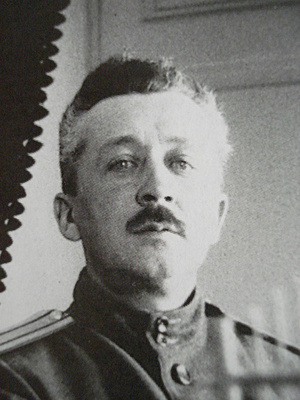


SOURCE: The Last Days of the Romanovs, published 1920, George Gustav Telberg, Robert Wilton, Nikolai Sokolov, ch. Examination of E. S. Kobylinsky
PHOTOS: Colonel Kobylinsky, dates unknown. Arrest photograph of Klavdia Mikhailovna Kobylinskaya, formerly Bitner, shortly before her execution
#Ipatiev House#Ekaterinburg#Alexander Palace#captivity#romanovs#OTMA#sources#descriptions#Olga Nikolaevna#Tatiana Nikolaevna#Maria Nikolaevna#Anastasia Nikolaevna#Colonel Kobylinski#Klaudia Bitner#Klavdia Bitner#Alexei Nikolaevich
83 notes
·
View notes
Text
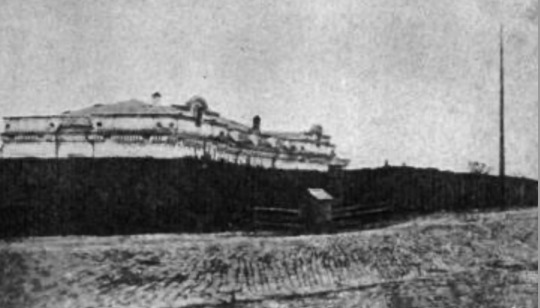
Rare photo of the Ipatiev House aka “The House of Special Purpose” as it was at the time when the Romanov Family were residents, Yekaterinburg, Spring-Summer of 1918
#I have always found this photo special…#ipatiev house#romanovs#romanov#russian history#russian imperial family#NAOTMAA#otma#otmaa#captivity#1918#house arrest#the house of special purpose#yekaterinburg
21 notes
·
View notes
Text








#Ipatiev House#alexandra feodorovna#Nicholas II#alexei nikolaevich#tatiana nikolaevna#maria nikolaevna#olga nikolaevna#the last czars#history#documentary
4 notes
·
View notes
Text
The saddest day in my life
July 17th
On this day, 105 years ago, Wednesday July 17th 1918, Tsar Nicholas II of Russia (50), his wife Tsarina Alexandra Feodorovna (46) and their children, Grand Duchesses Olga (22), Tatiana (21), Maria (19), Anastasia (17), Tsarevich Alexei (13), their four loyal friends, Alexei Trupp (62), Ivan Kharitonov (46), Anna Demidova (40), Evgenie Botkin (53) and beloved pets Ortipo (4) and Jimmy (3) were brutally murdered in shooting by Bolsheviks in Ipatiev House, Ekaterinburg.
Orthodox chuch has canonised them as Saints after the fall of communism.
We can only believe that they are praying for us. 😭💔
#saddest#17th July#17th July 1918#long live the monarchy#god save the tsar#tsar nicholas ii#tsarina alexandra#olga nikolaevna#tatiana nikolaevna#maria nikolaevna#anastasia nikolaevna#alexei nikolaevich#alexei trupp#anna demidova#ivan kharitonov#evgenie botkin#ipatiev house#house of the special purpose#house of romanov#romanov#romanovs#ortipo#jimmy
32 notes
·
View notes
Text
The Crown 5: Production Design



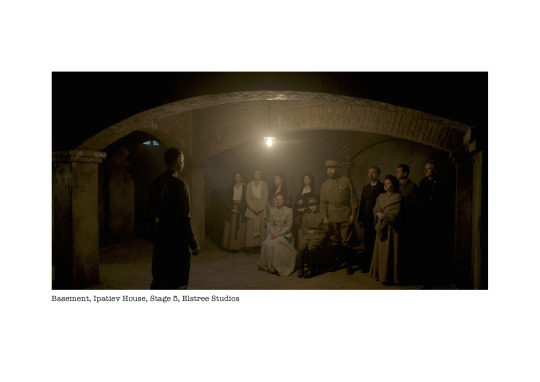

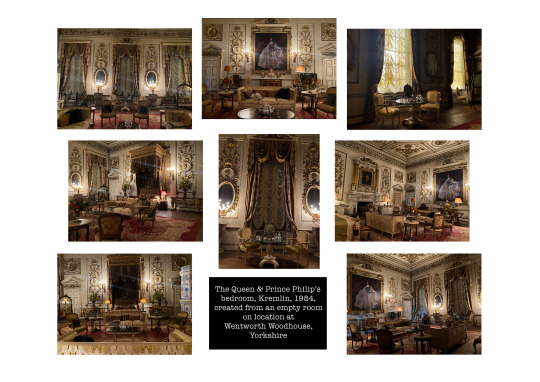





Netflix is submitting Season 5 Episode 6 for
OUTSTANDING PRODUCTION DESIGN FOR A NARRATIVE PERIOD OR FANTASY PROGRAM (ONE HOUR OR MORE) "IPATIEV HOUSE" MARTIN CHILDS, MARK RAGGETT, ALISON HARVEY
Photo: Netflix FYSEE. Emmy 2023 nominations round voting starts June 15!
#the crown netflix#the crown#imelda staunton#jonathan pryce#the crown season 5#emmys 2023#thecrownnet#emmy awards#emmys#fyc#for your consideration#netflix fysee#production design#martin childs#production designer#emmy award winning#buckingham palace#windsor castle#ipatiev house#1994#kremlin#wentworth woodhouse#filming locations#russian architecture#1990s
15 notes
·
View notes
Text
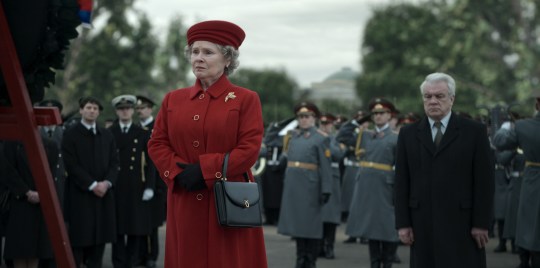
Imelda Staunton and Anatoliy Kotenyov in The Crown (2016-) Ipatiev House
S5E6
Taking the reestablishment of Anglo-Russian relationships by the exhumation of the remains of the Romanov family as a background, Queen Elizabeth reflects on her personal relationship with husband Prince Phillip: does a couple need to have common interests to stay afloat or can a marriage survive in spite of seemingly growing apart?
#The Crown#2022 episode#Ipatiev House#tv series#Imelda Staunton#Anatoliy Kotenyov#Romanov family#90s#Boris Yeltsin#Queen Elizabeth II#biography#drama#history#S5E6#just watched
3 notes
·
View notes
Photo

The Crown
Season 5, “Ipatiev House”
Director: Christian Schwochow
DoP: Frank Lamm
#The Crown#Ipatiev House#The Crown S05E06#Season 5#Christian Schwochow#Frank Lamm#Imelda Staunton#Queen Elizabeth II#Jonathan Pryce#Prince Philip Duke of Edinburgh#Peter Morgan#Netflix#Left Bank Pictures#Sony Pictures Television#TV Moments#TV Series#TV Show#television#TV#TV Frames#cinematography#9 November#2022
3 notes
·
View notes
Text
What happened to the Romanov’s was nothing short of a fucking travesty. And I hope that every single one their murderers are burning in hell where they belong
3 notes
·
View notes
Text

IPATIEV HOUSE
The Assassination of Tsar Nicholas II and his Family
The Russian royal family spent 78 days inside the Ipatiev house and were imprisoned there since 30 April 1918. The royal family included Tsar Nicholas II, his wife Alexandra, and their four daughters and their son and heir Alexei. The royal doctor, chambermaid, cook and valet also lived inside the house to attend to the family. The house was guarded, and the family couldn’t escape, the commander of the guard was Yakov Yurovsky.
On the night of 16-17 July 1918, Yurovsky told the prisoners to go downstairs to the cellar as they were to be evacuated. The Romanovs and staff walked downstairs to the cellar located at the back of the building. Chairs were placed in the cellar for Alexei and Alexandra. The group remained in the cellar for some time until Yurovsky appeared with armed men and told the group they were to be assassinated. The Bolsheviks brutally beat and shot their victims. After their death they beat their bodies, burned and then dumped them into a hole inside the forest. During Communist rule in Russia, it wasn’t permitted to acknowledge the royal family. Their bodies weren’t discovered until the 1990s and early 2000.
Since 1927, the house was used for numerous purposes – a Revolution Museum, a school, and for Communism. Many curious locals visited the house and its cellar. The cellar walls still had bullet holes from the time of the assassination. The house gained much interest from the public, and even though it wasn’t permitted people would sneak there at night to leave tokens such as flowers for the victims. The Communists realised the royal family had sympathy from the public and in 1977, they made the decision to destroy the house. Destroying the house didn’t stop visitors and they continued coming to mourn the dead.
At the end of Communism power in Russia in 1991, the Church on the Blood was built on the site. On one side is a cross which marks the location of the family’s murder. Today, the public are permitted to visit the site and pay their respects.
#ipatievhouse #romanov family #bolsheviks #borisyeltsin #churchontheblood
#ipatiev house#ipatievhouse#romanovs#romanov family#tsar nicholas II#anastasia romanov#church on the blood#russia
1 note
·
View note
Text
"Come away from the window, Anastasia" in Cyberian Demons alludes to the real-life Romanovs' last days, when they were imprisoned at Ipatiev House in 1918. The family of 7 and a handful of retainers were confined to the upper level of the house, where the windows were locked and whitewashed over to prevent them from receiving any outside news of the revolution. It was summer and stifling in the makeshift prison, and after much pleading, the guards allowed the family to open two windows on the condition they would not look out into the street. Tsarina Alexandra was reprimanded for listening at the window, and Anastasia was shot at by a guard for peeking out.
#or I'm reading way too far into things#but i don't really think i am#the mechanisms#nastya rasputina#cyberian demons#also#Ipatiev House was referred to as “the house of special purpose” at this time#not relevant but it sure sounds cool
49 notes
·
View notes
Text
Kolya Derevenko + Alexei Nikolaevich edit
“I was a little boy, just twelve years old. I did not know of the evil in people’s souls. Until that sad day of July 17, 1918, my father, Gilliard, Gibbes, and others knew everything, but I knew nothing. Something terrible was going to happen, but I didn’t know what it was… In the last week of July 1918, myself, my father, Gilliard, Gibbes, and others entered the Ipatiev house. There was a terrible scene… The house was in complete chaos; diaries, letters, albums, and other things were strewn all around in the house.. “But where is Ieskela*?” I asked my father, but he stayed silent... I was confused. “Papa, where is my Ieskela?*’– I asked. “They killed him”, he said, and I started to cry. “But how?” – I replied. “They killed the Tsar, the Tsaritsa, and the Grand Duchesses too. They are all dead.” – said my father.”
— Kolya Derevenko, Alexei Nikolaevich’s best friend and son of his physician Doctor Derevenko
*Kolya and Alexei used to have special nicknames for each other where they spelled their names backwards. Kolya was Aylok and Alexei was Ieskela.
Credits to overlay here
#alexei nikolaevich#kolya derevenko#Kolya and Alexei#my edit#made by me#mine#video edit#sad edit#romanov edit#edits#tsarevich alexei#kolya#alexei romanov#romanov#romanovs#Derevenko#doctor Derevenko#so sad :(#yekaterinburg#ipatiev house#captivity#july 17#1918#quotes
36 notes
·
View notes
Text
Recollection of Pierre Gilliard of the Ipatiev House, when he entered the basement just days after the murders
"I then went to the lower storey, the greater part of which was a basement. I entered with intense emotion the room in which, perhaps, they had died. Its aspect was most sinister. Daylight came in through a window with iron bars across it. The walls and the floor bore marks of bullets and bayonet thrusts. It was quite obvious that a dreadful crime had been committed there, and that several people had been killed.
In my despair believed that the Emperor had perished, and, that being the case, I could not believe the Empress had survived him. I had seen her at Tobolsk, when Yakovlev had come to fetch the Emperor, fling herself in the most dangerous place, I had seen her after several hours of agony, when her feelings as a wife and a mother had had a desperate struggle, end by leaving her sick child, though it tore her heart in two, in order to follow her husband, whose life she thought was threatened.
Yes, it was quite possible that they had both been killed. And the children? Had they also been massacred? I could not believe it. The idea was too horrible. And yet everything seemed to prove that the victims had been numerous."
SOURCE: The Crime of Ekaterinburg, Illustrated London News - Saturday, 1 January, 1921
PHOTO: The basement in Ipatiev House, taken for the Sokolov Report, shortly after the murders. A high quality version of this photograph is reproduced in Last Diary of the Tsarina.

#old newspapers#Pierre Gilliard#Ekaterinburg#Sources#Ipatiev House#Romanovs#Romanov family#Russian history#my own
57 notes
·
View notes
Note

Hello! I don’t really know what this ask is meant to mean, based off of the last ask I just posted it could mean something rude but I’m going choose to post information on this photo because it’s apart of Romanov history.
This image shows a covered up execution room of the Romanov family. I’ve always known the people here to be white army guards but I’m not so sure about that now because the writing above says the date is November 20th 1927 (not verified) so either guards or civilians. They are pointing to bullet marks made by the pistols used to execute the family on July 17th 1918. This is one image of how the execution room looked after the Bolsheviks fled the house and before the house was torn down in the 1990s. If someone could provide more explicit detail then I would be glad!
4 notes
·
View notes
Text








2 notes
·
View notes
Text
~17th July, 1918 edit~
my edit made by using capcut
#tsar nicholas ii#alexandra feodorovna#olga nikolaevna#tatiana nikolaevna#maria nikolaevna#anastasia nikolaevna#romanov edit#anna demidova#ivan kharitonov#alexei trupp#evgenie botkin#alexei nikolaevich#ipatiev house#sad edit#my edit#17th July 1918#17th of july#im crying here#😭🇷🇺💔❤️🩹
6 notes
·
View notes